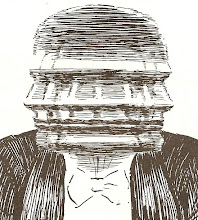 This isn't a post about "Anonymous", the 4chan meme (although that is a fascinating story, so maybe I'll have to do that some other time)*. I want to write something now about being anonymous. I've been thinking about blog anonymity a lot lately, but I'm still really uncertain about it. Maybe writing will help me make up my mind. Maybe you can help me out in the comments.
This isn't a post about "Anonymous", the 4chan meme (although that is a fascinating story, so maybe I'll have to do that some other time)*. I want to write something now about being anonymous. I've been thinking about blog anonymity a lot lately, but I'm still really uncertain about it. Maybe writing will help me make up my mind. Maybe you can help me out in the comments.First: I started a blog a while ago. I wasn't really sure what I wanted to do with it, but I thought it would be good opportunity (and excuse) to force myself to practise different ways of writing. Which is what it's actually been, more or less, I think. I posted as "Thoapsl" because in my mind, that stood for "think of a pseudonym later". (Yeah, I know, I know...)
BUT. As of Wednesday, I'm no longer anonymous: my blog now carries my actual name. So? Even before, it was possible for people to figure out my identity if they tried hard enough. But I'd always had a vague paranoia that without anonymity, I was more vulnerable; that I couldn't post anything without fear of it haunting me irl. Anonymity meant the freedom to relax.
That's what I thought my motivation was. But in fact I've always cared about what I post, anyway, whether anonymous or not. Thoapsl's reputation isn't my reputation, but it's a reputation that I care about. I've even gone out of my way not to swear online, mostly, despite the fact that my natural inclination is to swear like a m*therf*ck**g c**tf*xed tro**er.
So if it's not really about freedom, what's my real paranoia? Am I maybe worried about potential employers not hiring me, because of something on my blog that they don't like?
I know I'm definitely conflicted about angling for employment via my blog. I want my personal blogging to be for fun and random – I don't want to feel constrained by purpose. I definitely don't want to seem mercenary. But if someone actually emailed me tomorrow and said "Hey Tim, I read your blog and I would like to give you money for something" – that would be great, wouldn't it? And if there's nothing on my blog that would actually lose me a job – at least, any job worth having – then what's the worst that could happen?
Maybe I've talked myself into it. Maybe I'm still unsure. Either way I probably need to work on my blogger profile some more. (Maybe I'm just embarrassed that I don't have a real "occupation" to fill in on my profile, yet.)
Is anonymity worth it? Do you care about it, yourself? Would you (or do you?) blog anonymously, or under your real name? Best answer wins a prize.





